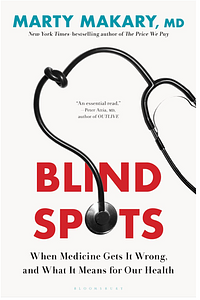Take a photo of a barcode or cover
71 reviews for:
Blind Spots: When Medicine Gets It Wrong, and What It Means for Our Health
Marty Makary
71 reviews for:
Blind Spots: When Medicine Gets It Wrong, and What It Means for Our Health
Marty Makary
informative
slow-paced
informative
reflective
medium-paced
challenging
informative
medium-paced
I like the main point the author is trying to make and I enjoyed learning about some new topics, but he is often times hypocritical and could take his own advice. Some of the anecdotes he uses to prove his own point are from research studies that are accepted as false or poorly done. The last few chapters were mostly unnecessary. While I’m all for learning about different viewpoints, this book is full of harmful contradictions so I can’t ultimately recommend it.
informative
reflective
Although Blind Spots is very much a mixed bag, I still recommend reading it. Some of his worst offenses are arrogance, hypocrisy, revisionist history, and a desperation to be seen as a rebel, even if it means abandoning his principles. He is generally very data-driven, though several times in the book he is guilty of making points by using single anecdotes, despite savaging others for doing the same.
So why would I still recommend the book? Well, he does cover several very important medical topics in detail that I've not seen frequently elsewhere. It would have been a much better book if he didn't have so many axes to grind, but I still appreciate the very positive difference he's been able to make in the practice of healthcare.
Example quote:
'I personally like to refer to people with opposing ideas as "interesting" rather than branding them with a pejorative label.'
However, he repeatedly attacks people with opposing ideas in this book.
Another example quote:
'Admitting "we don't know" takes humility, but isn't that an essential trait of great doctors?'
I think Dr. Makary is, in fact, a great doctor, despite a limited indication of that essential trait.
He did at least show some self-awareness earlier in the book when discussing ideas for new research proposed by colleagues
"I could be kinder in pointing out the limitations of each idea that we don't want to pursue."
Regarding AIDS/HIV and blood transfusions, he criticized several people and organizations about statements made in 1983 because of information that he also admits wasn't well publicized until 1985.
While reading the book, I listened to a podcast interview between Dr. Peter Attia and Dr. Makary. Makary made the ridiculous assertion that the people we should be paying to are the ones who are laughed at by academics (though maybe he intended an exclusion for university researchers and practicians like himself). Attia called him out on this, saying that we should usually be laughing at them because maybe only 1 in 20 times are they arguing for something worth paying attention to.
So why would I still recommend the book? Well, he does cover several very important medical topics in detail that I've not seen frequently elsewhere. It would have been a much better book if he didn't have so many axes to grind, but I still appreciate the very positive difference he's been able to make in the practice of healthcare.
Example quote:
'I personally like to refer to people with opposing ideas as "interesting" rather than branding them with a pejorative label.'
However, he repeatedly attacks people with opposing ideas in this book.
Another example quote:
'Admitting "we don't know" takes humility, but isn't that an essential trait of great doctors?'
I think Dr. Makary is, in fact, a great doctor, despite a limited indication of that essential trait.
He did at least show some self-awareness earlier in the book when discussing ideas for new research proposed by colleagues
"I could be kinder in pointing out the limitations of each idea that we don't want to pursue."
Regarding AIDS/HIV and blood transfusions, he criticized several people and organizations about statements made in 1983 because of information that he also admits wasn't well publicized until 1985.
While reading the book, I listened to a podcast interview between Dr. Peter Attia and Dr. Makary. Makary made the ridiculous assertion that the people we should be paying to are the ones who are laughed at by academics (though maybe he intended an exclusion for university researchers and practicians like himself). Attia called him out on this, saying that we should usually be laughing at them because maybe only 1 in 20 times are they arguing for something worth paying attention to.
challenging
hopeful
informative
inspiring
reflective
medium-paced
challenging
hopeful
informative
inspiring
sad
medium-paced
informative
medium-paced
challenging
informative
fast-paced
I would’ve had more respect for this book if the author had applied his own principles to himself
challenging
informative
reflective
medium-paced


